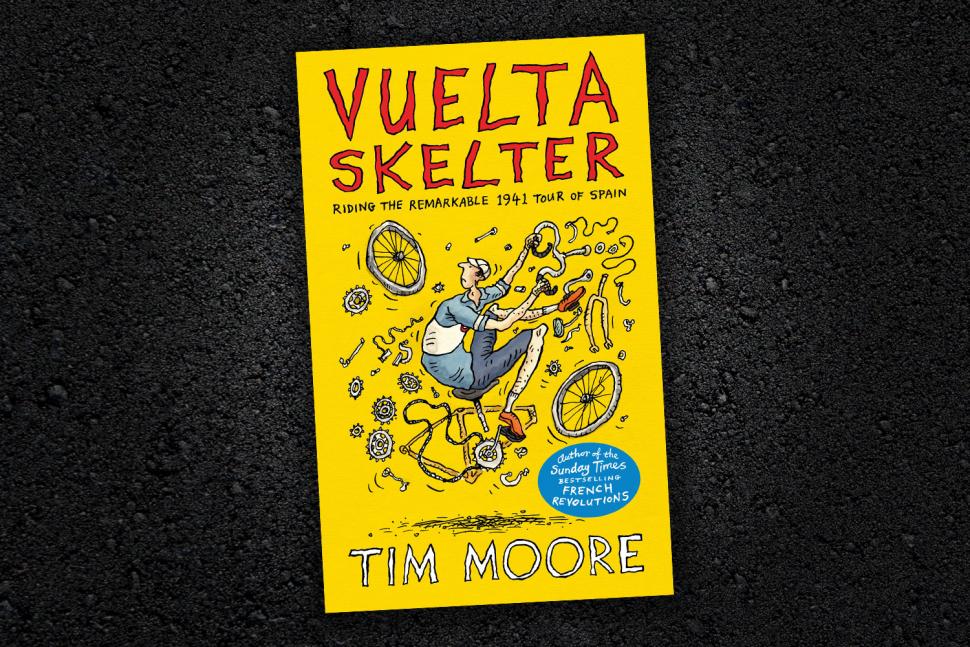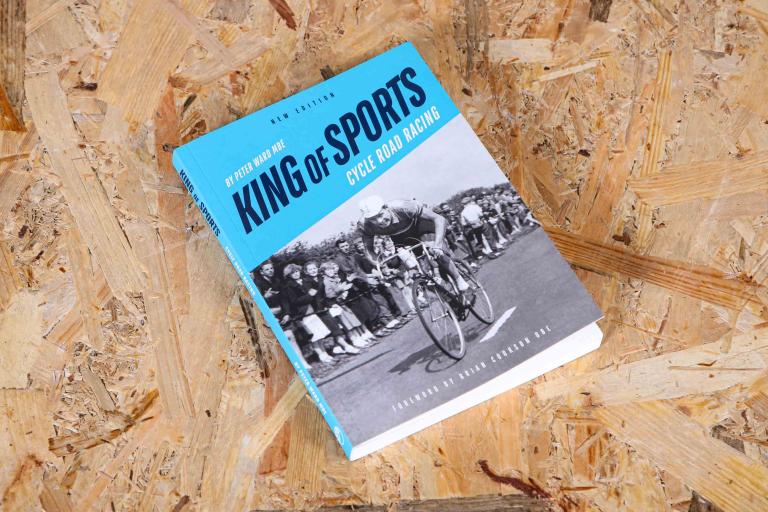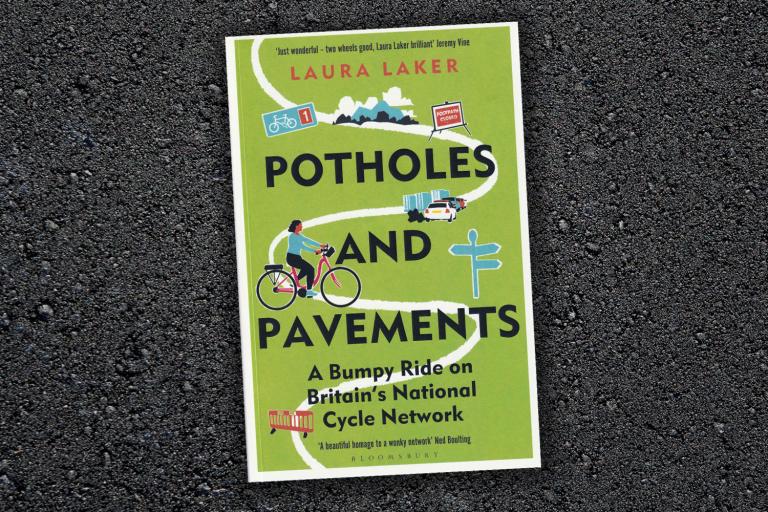- News
- Reviews
- Bikes
- Accessories
- Accessories - misc
- Computer mounts
- Bags
- Bar ends
- Bike bags & cases
- Bottle cages
- Bottles
- Cameras
- Car racks
- Child seats
- Computers
- Glasses
- GPS units
- Helmets
- Lights - front
- Lights - rear
- Lights - sets
- Locks
- Mirrors
- Mudguards
- Racks
- Pumps & CO2 inflators
- Puncture kits
- Reflectives
- Smart watches
- Stands and racks
- Trailers
- Clothing
- Components
- Bar tape & grips
- Bottom brackets
- Brake & gear cables
- Brake & STI levers
- Brake pads & spares
- Brakes
- Cassettes & freewheels
- Chains
- Chainsets & chainrings
- Derailleurs - front
- Derailleurs - rear
- Forks
- Gear levers & shifters
- Groupsets
- Handlebars & extensions
- Headsets
- Hubs
- Inner tubes
- Pedals
- Quick releases & skewers
- Saddles
- Seatposts
- Stems
- Wheels
- Tyres
- Health, fitness and nutrition
- Tools and workshop
- Miscellaneous
- Buyers Guides
- Features
- Forum
- Recommends
- Podcast
review
 2021 Vuelta Skelter by Tim Moore
2021 Vuelta Skelter by Tim Moore£20.00
VERDICT:
Another unnecessarily difficult journey on an unsuitable bike by an ill-prepared rider: marvellous
Delivers as promised and as expected
No pictures
Weight:
530g
Contact:
At road.cc every product is thoroughly tested for as long as it takes to get a proper insight into how well it works. Our reviewers are experienced cyclists that we trust to be objective. While we strive to ensure that opinions expressed are backed up by facts, reviews are by their nature an informed opinion, not a definitive verdict. We don't intentionally try to break anything (except locks) but we do try to look for weak points in any design. The overall score is not just an average of the other scores: it reflects both a product's function and value – with value determined by how a product compares with items of similar spec, quality, and price.
What the road.cc scores meanGood scores are more common than bad, because fortunately good products are more common than bad.
- Exceptional
- Excellent
- Very Good
- Good
- Quite good
- Average
- Not so good
- Poor
- Bad
- Appalling
One could summarise Vuelta Skelter by simply saying that all of the skills Tim Moore has deployed in his previous travelogues are present and correct. As always, the actual basis of his trips is secondary to his skills as a raconteur in producing another entertaining story, but what has the master of the genre been up to this time?
Moore seems to have a knack for coming up with great ideas for his adventures, and I am sure that many of us often wonder what he will do next. I have a theory that he finds a title that makes sense to his audience, and then creates a journey to suit the name. Furthermore, I suspect he tries to alternate his cycling adventures with those using other modes of transport, just to make sure that when he embarks on a cycling trip he is sufficiently unfit for that to have a role in the narrative.
Just as the Tour de France begat French Revolutions, and the Giro d'Italia gave rise to Gironimo, so the Spanish Grand Tour has been the prop for Vuelta Skelter: it's a logical extension of a proven idea, and it doesn't continue with the non-racing theme that he used last time out.
As is often the case with Moore, there is a bit of historical context embedded in the trip. Actually, there is probably more than we've been used to, but the Spanish Civil War and its associated slaughter needed to be treated with appropriate respect.
The focus is on Julián Berrendero in the 1941 Vuelta. I was not aware of Berrendero before Moore brought him to our attention, and (I suspect) like most people I am unlikely to read a lot more about his life. That is not to belittle his achievements, but simply reflects the fact that his incredible exploits are really only of interest because they provided Moore with an excuse to undertake his trip.
Oh yes, and the fact that he produced an autobiography in 1949 from which Moore could draw inspiration, facts, and quotes was helpful: Mis Glorias y Memorias. Unlikely to be available from Amazon or your local stockist.
There is a better case to be made for choosing 1941, in the context of the other things that were happening both in Spain and on the world stage at the time – but surely the real attraction was that it was a tough race that year, which is exactly the back-story that Moore needs to set up his own adventure.
Then there is the imperative to use a bike that fits with the story. His choice was rudely described as 'a Neanderthal piece of shit' by one unhelpful bike shop – but it was sure to provide Moore with a rich seam of mechanical struggles and mishaps with which to regale us.
Despite the somewhat solemn setting, Vuelta Skelter still has plenty of the wry humour and light-hearted observations that Moore does so well. Here is but one example that I (and anyone who has cycled in Spain) can appreciate: the fact that each roundabout 'came introduced with a strident warning sign suggested a certain native unfamiliarity with rotary traffic management…but it was always just a bit terrifying to see how often they needed reminding not to do unbelievably stupid and dangerous things'.
A combination of not knowing much of the language and frequently trying to communicate with non-English-speaking Spaniards also helps with the comedic value of many interactions.
> Buyer’s Guide: 42 of the best cycling books
The planning and execution of this trip was overlaid by a more modern factor: Covid-19. As lockdown struck, 'my first task under house arrest was to settle down and watch a career in travel journalism die before my eyes'. Moore deserves great credit for managing to navigate his way through restrictions and seize suitable opportunities for his trip, and would be fully deserving of a place in the Cycling Through A Pandemic book. Not surprisingly, this was one area where he had to get all his logistics right, and he couldn't rely on his usual cavalier approach.
I noticed that the cover still references Moore as the 'author of the Sunday Times best-selling French Revolutions', as have all of his previous cycling works. Surely it is about time to acknowledge that French Revolutions is a great work, but should no longer be singled out. While it set a high standard, it is one that Moore has consistently and reliably matched in subsequent travelogues.
Verdict
Another unnecessarily difficult journey on an unsuitable bike by an ill-prepared rider: marvellous
road.cc test report
Make and model: Vuelta Skelter by Tim Moore
Size tested: 336 pages
Tell us what the product is for and who it's aimed at. What do the manufacturers say about it? How does that compare to your own feelings about it?
From the publisher:
Tim Moore completes his epic (and ill-advised) trilogy of cycling's Grand Tours.
Julian Berrendero's victory in the 1941 Vuelta a Espana was an extraordinary exercise in sporting redemption: the Spanish cyclist had just spent 18 months in Franco's concentration camps, punishment for expressing Republican sympathies during the civil war. Seventy nine years later, perennially over-ambitious cyclo-adventurer Tim Moore developed a fascination with Berrendero's story, and having borrowed an old road bike with the great man's name plastered all over it, set off to retrace the 4,409km route of his 1941 triumph - in the midst of a global pandemic.
What follows is a tale of brutal heat and lonely roads, of glory, humiliation, and then a bit more humiliation. Along the way Tim recounts the civil war's still-vivid tragedies, and finds the gregarious but impressively responsible locals torn between welcoming their nation's only foreign visitor, and bundling him and his filthy bike into a vat of antiviral gel.
Tell us some more about the technical aspects of the product?
Title: Vuelta Skelter
Author: Tim Moore
Publisher: Jonathan Cape
Date: 12/8/21
Format: Hardback
Pages: 325
ISBN: 9781787333055
Price: £20
Tell us what you particularly liked about the product
It's dependable entertainment.
Tell us what you particularly disliked about the product
Lack of pictures.
Did you enjoy using the product? Yes
Would you consider buying the product? Yes, when discounted.
Would you recommend the product to a friend? Yes
Use this box to explain your overall score
Some things can be relied upon, and Tim Moore managing to keep us entertained is one of them; the presence of Covid-19 made the trip more challenging, but also provided some extra opportunities for mishap and misunderstanding that may never be available again.
About the tester
Age: 60
I usually ride: My best bike is:
I've been riding for: Over 20 years I ride: Most days I would class myself as: Expert
I regularly do the following types of riding: touring, club rides, sportives, general fitness riding,
Latest Comments
- chrisonabike 2 sec ago
Don't mention them!!
- brooksby 7 min 7 sec ago
Uuurrrgh Uuurrath Aaah Mumble Mumble Mumble Cyclists mumble mumble, uuuurrrrgh mumble uuurrgh, lycra, mumble mumble <cough> uuaarr mumble...
- Rendel Harris 12 min 41 sec ago
Absolutely, so many of them quite clearly have chosen the job because they get to wear a uniform and a stab vest and carry a walkie-talkie so they...
- brooksby 14 min 4 sec ago
So the footpath has always been there too? Doesn't Cllr Lake think its a problem that motorists are apparently pulling out of the garage forecourt...
- Muddy Ford 17 min 55 sec ago
Would the cutting down of the hedge then enable another access road to the new estate, so do it under the guise of 'active travel'? I agree with...
- David9694 41 min 46 sec ago
Bus hits house as snow causes travel disruption and shuts schools across Yorkshire...
- Carmic0 2 hours 34 min ago
Nice to see the Passoni with external cabling.
- mark1a 7 hours 15 min ago
Yes, I agree, and thanks for replying, what I was trying to say (badly) was that Look wasn't really a bike company back then. ...
- George Hill 11 hours 18 min ago
Foxcote Hill in Ilmington - it's steep, it's not too long, and once you get to the top you can see the for miles across the Cotswolds....
- stonojnr 11 hours 26 min ago
well at least they didnt go for British Racing Green as well ,as then theyd have two trademark licensing cases up against them....




Add new comment
13 comments
I had the misfortune of being given 'Geronimo' as a gift a while ago. I came to dislike Tim Moore very much as a person (well..the person he chooses to portray himself as in the book), dislike his heavy-handed schoolboy irony, his annoying resorting to expletives for the sake of it. If the real Tim Moore is anything like the character in the awful 'Geronimo' he can only be described as a w....r of the highest order. I won't be buying this book based on my previous experience which i hope at least informs others and won't prove to be a total waste of my time.
I read 'The Cyclist Who Went Out in The Cold' a while back, a few really funny bits but on the whole it felt quite contrived.
All cycle trips of more than a day are 'contrived'. You plan them, you ride them, he happens to write about them. It's not like he goes out of his way to line up bad things to happen to himself?
I would disagree.
When you set out to ride along the old iron curtain, in winter, on a bike which you know is very much the wrong choice for such an adventure then many of the 'bad things' that happen are entirely predictable.
He sets himself up for a fall, falls over, then writes about it.
That doesn't stop it being funny in places but it does make it contrived.
Well, yes, in that sense it's contrived, but that's the point of the book - to ride the iron curtain on the type of bike used by someone who lived behind the iron curtain. I thought it was a great book; as is Vuelta Skelter. Some of the details about the Spanish Civil War are truely horrific, and yet he handles them sensitively in a book which is also largely humorous. (I am unashamedly a big fan of Tim's and credit/blame him - among others - for inspiring my year of cycling to every Palace match for a season five years ago.)
You'd seriously prefer a book written by an anally-retentive planning / details / bike maintenance wizard on a perfect and perfectly-suited bike, for whom nothing ever goes wrong and who has an utterly uneventful trip? That sounds like paint drying. And more contrived than the reality of most people's cycling. Most people make mistakes in planning / execution. What amazes me is that more things *don't* go wrong for Tim. And when they do it's how others help him or how he gets out of the situations that reveal some of the best moments of his books - and humanity. Planned perfection would rob us of them.
To my mind Moore's books seem akin to scripted reality television.
He deliberately puts all the pieces in place for 'hilarious mishaps' then documents them.
I don't find those aspects of the book enjoyable at all.
In that regard I'd prefer he planned and prepared a bit better and then left those bits out entirely.
Agree. I read French Revoltions and, again, thought he went out of his way to create problems. I also didn't like the way he looked down his nose on the foreign couple that passed him on one of the climbs even though they were being friendly. Haven't read another of his since.
Can't lay my hands on my copy just now, must have lent it to someone, but as I recall he was mean-spirited in his thoughts towards the couple who passed him on the climb and then gave himself a good telling off for being so and for being childish, didn't he?
He might have done, I can't remember either. Being a bit ocd when it comes to preparing for any ride (short, long or multi-day) the whole premise of almost zero planning or training just wasn't for me - a couple of short training rides and then deciding to ride multiple 100 mile days, and he found it tough!!!
Really enjoyed this book, every bit as good as French Revolutions and Gironimo. As the reviewer notes here, more history than usual but as expected given that it's recreating a race just after the civil war and with a winner/central protagonist (of whom I'd never heard, I'm ashamed to say) who'd just been released from Franco's camps. I've read a number of histories of the civil war and the standard fictional/autobiographical accounts - Orwell, Hemingway, Lee etc - but there was plenty in here that was new to me, including the startling fact that of 500,000 deaths in the war, nearly half were murders or executions. Some heartbreaking individual stories and a good overview of the war in general, alongside excellent cycling history and Moore's usual witty account of his triumphs and mishaps. Thoroughly recommended for anyone who likes cycling, Spain and/or history.
His books should mention being Mr Biffo's partner on Teletext's Digitizer on the front if they really want to sell #bringbackMrHairs
OMG really? I've been looking for a set of reversible sedgewicks for ages. Must ask him.